- Home
- Don DeLillo
The Names Page 5
The Names Read online
Page 5
There was a protocol of coping, of making do, and Ann was expert. I was learning that reticence was fairly common in such matters. There was a sense in which people felt it was self-incriminating to speak out against these violations. I thought I sometimes detected in people who had lost property or fled, most frequently in Americans, some mild surprise that it hadn’t happened sooner, that the men with the six-day beards hadn’t come much earlier to burn them out, or uproot the plumbing, or walk off with the prayer rugs they’d bargained for in the souk and bought as investments—for the crimes of drinking whiskey, making money, jogging in shiny suits along the boulevards at dusk. Wasn’t there a sense, we Americans felt, in which we had it coming?
Port Harcourt, Nigeria, Ann said, was the only real regret. There was sweet crude in the delta, a howling loneliness. Charles was doing security and safety for a refinery built by Shell and British Petroleum. She fled to Beirut and the war in the streets. The marriage lost some of its conviction but made eventual gains in the category of rueful irony when BP’s assets were nationalized.
They didn’t want to go back home. Too many years of elaborate skies, lithe people with plaited hair, red-robed, in bare feet. Or was that England today? They thought they might retire to California, where they had a son in graduate school, some kind of raving savant by the sound of it—a mathematician.
“The idea is to learn the language,” Charles said, “but not to let them know. This is what I do. I don’t let people know unless absolutely pressed.”
“But then what good is it?”
“I listen. I listen all the time. I pick up things, listening. I have an advantage in this regard. I’m not only a foreigner. I don’t look as if I speak Greek.”
“This is an incredible distinction, Charles. Are you serious?”
“You want to pick up whatever you can.”
“But don’t you do business here occasionally?”
“One does business in English. Surely you’ve come to suspect this.”
“If I ever learn the language, I’ll speak it as often as possible. I want to talk to them, I want to hear what they’re saying. These men arguing, there’s something serious, almost loving about it. I want to interrupt, ask questions.”
“You won’t pick up anything, talking to them.”
“I don’t want to pick up anything.”
“Using my method, you’ll learn infinitely more.”
“Charles, your method is crazy.”
“What about a Heineken then? Is it possible in this country to get beer in green bottles?”
“Seriously, do you speak Arabic?”
“Of course.”
“I envy that. I really do.”
“Ann’s a brilliant linguist. She’s done translation, you know. She’s very good.”
“My kid speaks Ob. It’s a kind of pig Latin. You insert o-b in certain parts of words.”
Charles hunched forward, his cigarette burning to the filter.
“Something almost loving,” he mumbled, glancing at the men around the tree.
“You know what I mean. There’s a certain quality in the language.”
“You want to interrupt. You want to ask questions.”
I watched Ann cross to us, emerging from a ring of poplars. A gait with a pleasing sway. Even at a distance, her mouth showed the small pursed conceit of a remark in the making. We stood, flanking her, and headed down a path toward the nearest gate.
“At any given time,” she said, “half the women in Athens are having their hair done by the other half.”
“They’ve worked wonders, clearly,” Charles said.
“It is such confusion. I’d still be there had it not been for no-shows and dropouts. James, I’ve never realized. You have khaki hair.”
“It’s brown.”
“If jeeps had hair, it would look like yours. He has khaki hair,” she told Charles.
“Leave him alone. He’s having lunch with George Rowser.”
“He’s having lunch with us. Where are we off to?”
“We’ll have dinner,” I said.
“Good. Shall I call anyone?”
“Call everyone.”
“What are all these people doing in the park?” she said. “Greeks hate fresh air.”
I pulled down a book on mythology for Tap. I took it to the cash register. The woman there directed me to a man across the room. I gave him the book and followed him to his little desk. He took a thick pad, wrote out a sales slip and gave it to me, without the book. I took the sales slip to the woman at the cash register. She took my money, stamped the slip and gave it back to me with my change. I put the stamped document in my pocket and went to the little desk. The man had wrapped the book and was sealing the package with transparent tape. He wanted my sales slip. I took it out of my pocket and gave it to him. He gave me a carbon copy. I put it in my pocket and left with the neatly wrapped book.
My life was full of routine surprises. One day I was watching runners from Marathon dodge taxis near the Athens Hilton, the next I was turning a corner in Istanbul to see a gypsy leading a bear on a leash. I began to think of myself as a perennial tourist. There was something agreeable about this. To be a tourist is to escape accountability. Errors and failings don’t cling to you the way they do back home. You’re able to drift across continents and languages, suspending the operation of sound thought. Tourism is the march of stupidity. You’re expected to be stupid. The entire mechanism of the host country is geared to travelers acting stupidly. You walk around dazed, squinting into fold-out maps. You don’t know how to talk to people, how to get anywhere, what the money means, what time it is, what to eat or how to eat it. Being stupid is the pattern, the level and the norm. You can exist on this level for weeks and months without reprimand or dire consequence. Together with thousands, you are granted immunities and broad freedoms. You are an army of fools, wearing bright polyesters, riding camels, taking pictures of each other, haggard, dysenteric, thirsty. There is nothing to think about but the next shapeless event.
One day I went out to find the streets full of children wearing costumes. I didn’t know what the occasion was, what was being commemorated. In the center of Athens there were hundreds of these children in elaborate masquerade. They walked hand in hand with their parents or ran among the pigeons in front of the war memorial. Children as cowboys, elves, moonwalkers, oil sheiks with black beards, toting briefcases. I didn’t ask what it meant. I was happy not knowing. I wanted to preserve the surprise in an opaque medium. This happened many times in large and small ways. Athens was my legal home but I wasn’t ready to give up tourism, even here.
In the flower market I saw a priest and a deacon come out of the church behind the stalls, leading a group of people who carried crosses and other objects. The priest had wild eyes and a flaring beard, the people may have been mourners. They walked once around the church and went back inside.
To be taken constantly by surprise was not the worst thing that could happen to a man living apart.
Rowser traveled under a false name. He had a total of three identities and owned the relevant paper. His office outside Washington was equipped with a letter-bomb detector, a voice scrambler, an elaborate system to prevent break-ins. He was a man who never quite took the final heavy step into foolishness and pathos, despite the indications. His life itself was the chief indication, full of the ornaments of paranoia and deception. Even his hoarse voice, a forced whisper, seemed a comic symptom of the clandestine environment. But Rowser’s massive drive, his will to see things through, overpowered everything else.
He was a businessman. He sold insurance to other business men. The subjects were money, politics and force.
I met him in the bar off the lobby of the Grande Bretagne, one of the duskier haunts, plush chairs, soft voices. He was a stocky man with glasses, going bald. He was drinking mineral water and making notes when I walked in.
“Sit down. I’m back from Kuwait.”
“Are they kill
ing Americans?”
“Not so you’d notice,” he said. “Not openly. What have you got for me?”
“George, can I order a drink?”
“Order a drink.”
“Turkey is an education in how far people will go to make a point. Except no one agrees on what the point is.”
“What else is new?”
“The weather was good.”
“Did you go to the mosques?”
“Not this trip,” I said.
“I can’t understand how people go to Istanbul and don’t do the mosques. I can spend hours in one mosque.”
“I was there on business, George.”
“Very good. But you can always make time for a mosque.”
“Are you religious?”
“Get away from me. I like the awe, that’s all.”
“Impressive architecture. I concede that much.”
“No pictures. I have entree to Vatican pictures no one gets in to see without stunning credentials. I want to see the stuff in Naples. The hidden rooms.”
“Who do you know?”
“I have a cardinal in the States.”
The waiter came, head tilted, a faintly mocking look in his eyes. I ordered a beer. Rowser’s ultra-secure briefcase sat next to him in the soft chair. It was full of painstaking assessments, I was sure. Data on the stability of the countries he’d been visiting. Facts on the infrastructure. Probabilities, statistics. These were the music of Rowser’s life, the only coherence he needed.
What connected us was risk.
He’d started in this line of work by gathering material for people who wrote scholarly reports on large-scale death and destruction. Rowser had a gift for numbers and a temperament that enabled him to separate mathematical techniques and actuarial science from the terrifying events he culled for his figures. In universities and research centers he attended any number of conferences at which people discussed such choice calamities as reactor meltdowns, runaway viruses and three-day spasm wars.
Somebody had to tell us what our chances were. Rowser’s problem was that he didn’t have the breadth and penetration to succeed as a risk analyst. He knew what he was, a night-school hustler, a man who figured the angles, brusque, enterprising, chained to late nights and caffeine. He was no game theorist or geopolitician. He had no system of assumptions and principles. What he had was a set of interlocking facts he’d drawn from tons of research material on the cost-effectiveness of terror.
There had been over five thousand terrorist incidents in the past decade.
Kidnappings were routine business.
Ransom requests of five million dollars were not unusual.
In this decade a quarter of a billion dollars in ransom money had been paid to terrorists.
Business executives were prime targets.
U.S. executives led the world, being targeted with particular frequency in the Middle East and Latin America.
Simple. He convinced a medium-sized insurance company to sell ransom policies to the multinationals. His job was to figure the risk of enrolling applicants for coverage. He read everything in the public record on terror and traveled widely to set up lines of data-gathering that helped him draw conclusions about overseas operations, the attitudes of host countries, political currents in general. Secrecy was important. If a terrorist group knew that a certain corporation insured its executives against kidnap and ransom, they’d clearly want to consider an action.
The man of narrow outlook becomes immersed. Rowser occupied himself profoundly in the customs and attitudes of the secret life. His thoroughness was compulsive and regenerative, a pathological condition. He stopped carrying company ID, he committed phone numbers and addresses to memory, he spent small fortunes on electronic devices. I don’t think he became involved in these things as some men do, because they verge on something deep and unseen, a dream life or alternate self. He wasn’t the kind of man who plays at danger. I think he was simply scared. Risk had become a physical thing.
“What’s that?”
“A book I bought my kid.”
“I’m a two-time loser,” he said.
“We’re only separated, George.”
“Get divorced.”
“Why?”
“Absolutely. I don’t even remember them. If they walked down the street together, I’d go right by.”
“I don’t want to discuss marriage. I did that an hour ago.”
“Drink your beer, we’ll go.”
“Where are we having lunch?”
“I don’t eat lunch. My doctor told me to drop one meal. We’ll walk around the block. I want an overview on Turkey.”
“It’s damn hot out there.”
“I don’t like talking where it may not be secure. Drink down your beer, we’ll go.”
“It’s insurance. That’s all it is, George. Nobody’s listening.”
“I’m the kind of person he doesn’t like to break a habit. I started doing things this way and maybe it’s not necessary anymore. Maybe it was never necessary, looking objectively. But a habit is the toughest thing to break for this type person. There is no logic in most habits. This is exactly why they take such hold. A habit is a death grip to somebody like me.”
The harsh dry scrape in his voice was halfway poignant. I first met Rowser at a seminar on foreign investments. Many voices besides his own at the Hay-Adams that day. Curious, I thought, how all these regional accents converged on the same sets of words. The language of business is hard-edged and aggressive, drawing some of its technical cant from the weapons pools of the south and southwest, a rural nurturing in a way, a blooding of the gray-suited, the pale, the corporate man. It’s all the same game, these cross-argots suggest.
By this time Rowser was head of development for the Northeast Group, a subsidiary of a two-billion-dollar conglomerates he referred to as “the parent.” No more edgy executives. The Northeast Group specialized in political risk insurance for corporations with foreign holdings. In recent years U.S. assets had been seized in two dozen countries and businessmen were looking for financial protection. All those grave Zaireans, those Pakistanis with their sensual lips and bright smiles, voices in melodic ascent, what sweet-natured technocrats they made, running the plants we’d designed and financed, using our very jargon.
Rowser and his group were writing political risk insurance in impressive amounts. They sold portions of the original policies to syndicates in order to spread risk and generate whatever cash flow the parent did not supply. He broadened his data collection network and installed a few key people called risk analysts, the title he’d felt unworthy of in the days when he gathered facts for the end of the world. This was the job he offered me. Associate director of risk analysis, Middle East.
I was a freelance writer, something of a Renaissance hack. Booklets, pamphlets, leaflets, all kinds of institutional litter for government and industry. Newsletters for a computer firm. Scripts for industrial films. Tax-planning strategies, investment strategies. We had three meetings. At the time I was ghosting a book on global conflict for an Air Force general associated with one of Rowser’s old encampments, the Institute of Risk Analysis at American University. Rowser had seen early pages of the manuscript and it was possible he’d been impressed by the way I’d reshaped the general’s muddled thinking. The general was a living wilderness. Everyone in the risk community knew this.
Rowser told me that material flowed into Athens from various control points around the Mediterranean, the Gulf and the Arabian Sea. It needed structuring, it needed perusal by someone with intellectual range. He wanted a view that was broader than the underwriter’s or statistician’s.
A tallish fellow with an educated face and khaki hair might be just what he needed for the region.
I turned him down. Kathryn, Tap and I were living in an old gabled house in the Champlain Islands, a place her father had owned, and we liked it there, among farms and apple orchards, a lake culture lying between the Green Mountains and the Ad
irondacks. My grubstreet ways suited us. We had a picture of ourselves as people who needed little. Kathryn was managing a crafts school on North Hero, one island up from us, and the occasional presence in our home of laconic young potters and quilt-makers gave the place a dusting of old-fashioned virtue. We wanted Tap to grow up in North America.
A year later we were in Toronto, dividing our books, and Kathryn was speaking Greek to a tape machine. So much for North America. I got in touch with Rowser. He had a man for the region but said he was interested in talking to me. I said it had to be Athens. He’d try to work it out, he told me. It took three months.
I’d have a steady job, an office, a secretary, a schedule and clear-cut responsibilities while my wife worked in a trench and my son wrote a novel. A happy pair. They were the freelancers now but I couldn’t shake the feeling that l was the one taking the major risk. There was nothing to come back to if l failed, no place in particular I belonged. They were my place, the only true boundaries I had. I went, l set out, as a man on a dangerous journey, feeling a grimness and will I’d never felt before.
Self-satisfied, willing to settle.
What are my qualities? This was a question that nagged at the whole affair. Passion, character, fortitude and wit. Cunning and dumb luck. I’d have to command something of all of these. Is this why people try to force events, to find out how complete they are and what they’ve managed to accumulate of drifting fortune? Some kinds of loneliness are an accusation. Do we feel this is what we are, broken down to entity, unpigmented?
The rocky brown island, the chalk village, the men spreading their yellow nets, all these forms of emitted light. The layered Minoan soil, ochre and rust and soot, and the shards of painted pottery, these are the passions that saturate the world. And it was Rowser, walking uphill past the jewelry shops along the pedestrian mall, half panting, who was the middleman of all this hazardous love. Rowser in his insurance man’s gray suit.

 Great Jones Street (Contemporary American Fiction)
Great Jones Street (Contemporary American Fiction)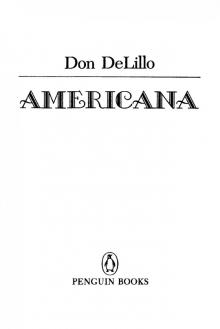 Americana
Americana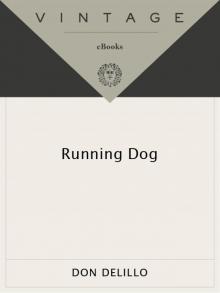 Running Dog
Running Dog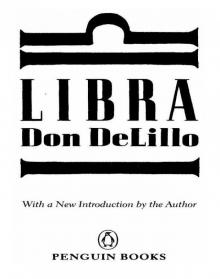 Libra
Libra End Zone
End Zone Ratner's Star
Ratner's Star Underworld
Underworld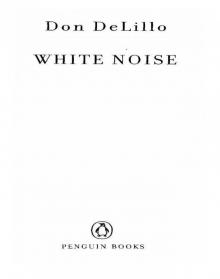 White Noise
White Noise Players
Players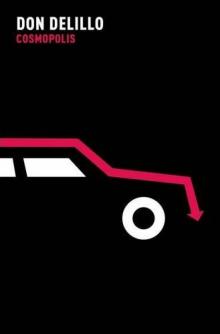 Cosmopolis
Cosmopolis The Silence
The Silence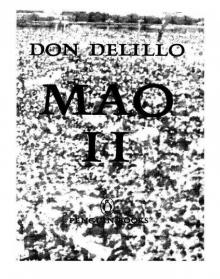 Mao II
Mao II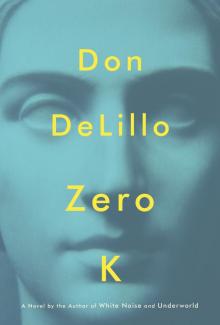 Zero K
Zero K Great Jones Street
Great Jones Street The Angel Esmeralda
The Angel Esmeralda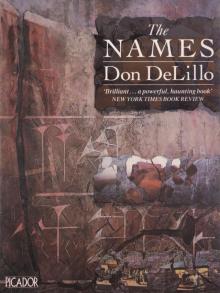 The Names
The Names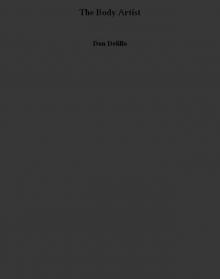 The Body Artist
The Body Artist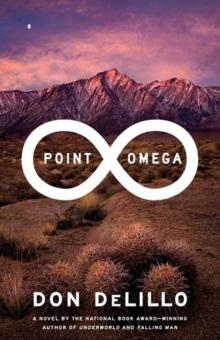 Point Omega
Point Omega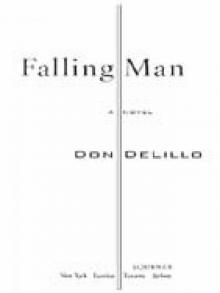 Falling Man
Falling Man